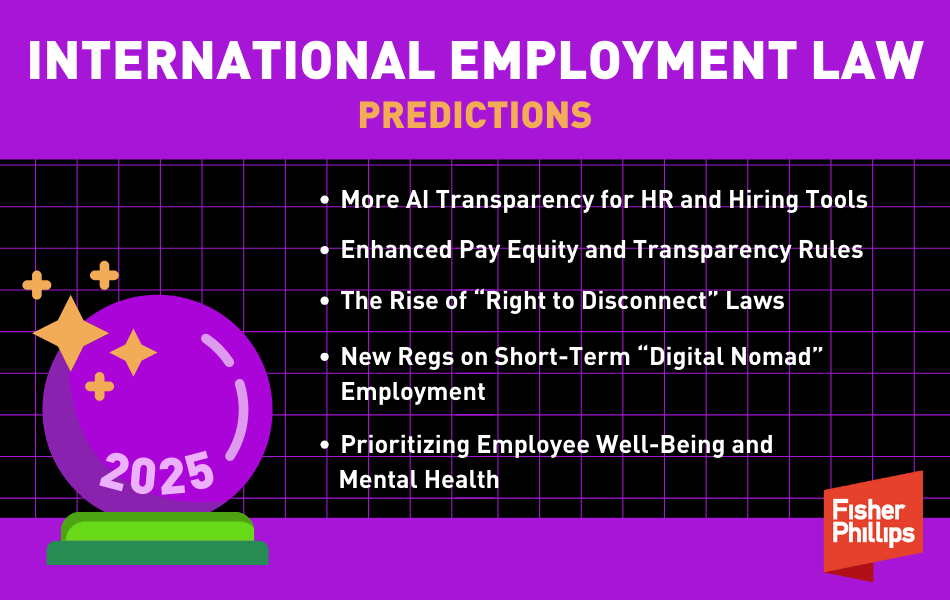Our International Practice Group thought leaders have pulled together their top predictions for the new year so that employers can get a running start to 2025. If you want more, register for our FP Workplace Law Forecast Webinar here.
More AI Transparency for HR and Hiring Tools
AI’s role in employment — especially in hiring, performance management, and data analytics – is likely to see strict oversight in several countries. The EU’s AI Act will likely inspire similar legislation elsewhere, with mandatory disclosures when AI is used for workplace decision-making. Companies may need to give employees the right to opt out of AI-driven processes, especially when it impacts career progression or compensation. Key focal points will be transparency in algorithms and avoiding hiring discrimination.
Enhanced Pay Equity and Transparency Rules
Pay equity efforts have already seen significant momentum in the EU and UK — and 2025 will likely bring a surge in similar laws globally. This could extend to mandatory salary range disclosures for job postings, detailed internal audits on pay discrepancies, and stricter enforcement mechanisms — and large multinational companies may need to ultimately disclose gender pay gaps. Additionally, pay transparency could be expanded to include a range of demographics, not just gender.
The Rise of “Right to Disconnect” Laws
While the “right to disconnect” has gained traction in the EU, we expect other regions to implement similar regulations, especially in Asia and the Americas. These laws will likely cover work-from-home policies, limiting after-hours communication, and regulating response times. Countries like Japan and South Korea, where burnout is a significant concern, may lead Asia in introducing such protections.
New Regs on Short-Term “Digital Nomad” Employment
The popularity of digital nomad visas will prompt new laws distinguishing between traditional employment and short-term, location-flexible work arrangements. Countries will likely create specific digital nomad legislation that include labor, benefits, and tax obligations. This could lead to a global patchwork of regulations, making it more complex for companies to manage and hire digital nomads.
Prioritizing Employee Well-Being and Mental Health
Employee well-being, including mental health, will move from being a perk to a mandated corporate responsibility in many countries. Regulatory bodies may implement metrics for psychosocial risks in the workplace, and mental health protections could be built into workplace standards. Many governments, notably in Europe and North America, could implement guidelines requiring employers to take measurable steps to support employee mental health.
Want More?
- You can read our entire FP Workplace Law 2025 Forecast here, full of predictions spanning many practice areas and industries.
- You can register for our FP Workplace Law Forecast 2025 Webinar here.
Conclusion
We will continue to monitor developments related to all aspects of international workplace law. Make sure you are subscribed to Fisher Phillips’ Insight System to get the most up-to-date information. If you have questions, contact your Fisher Phillips attorney, the authors of this Insight, or any member of our International Practice Group.




